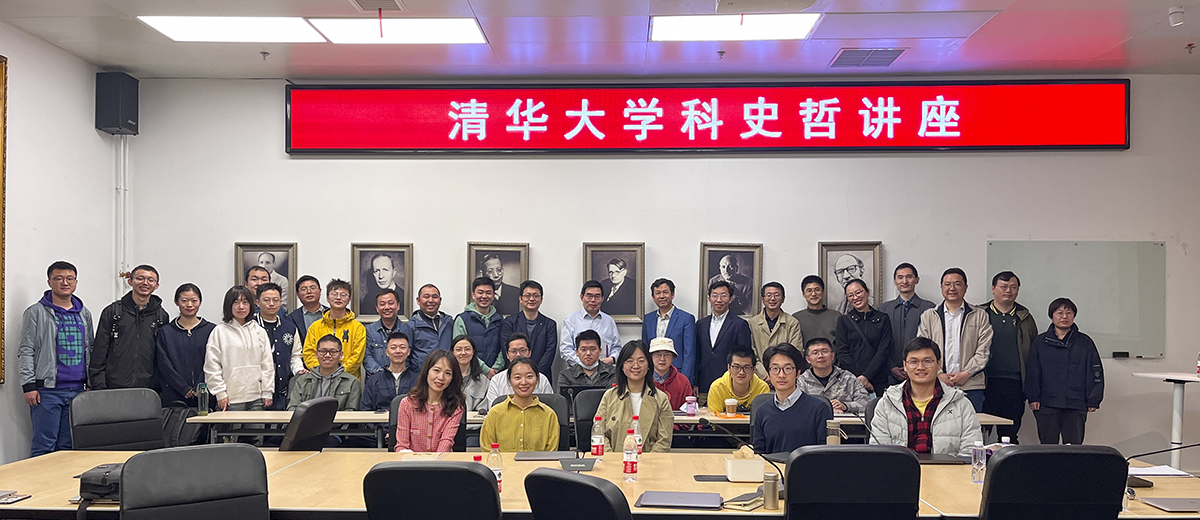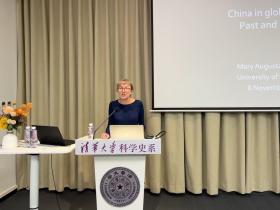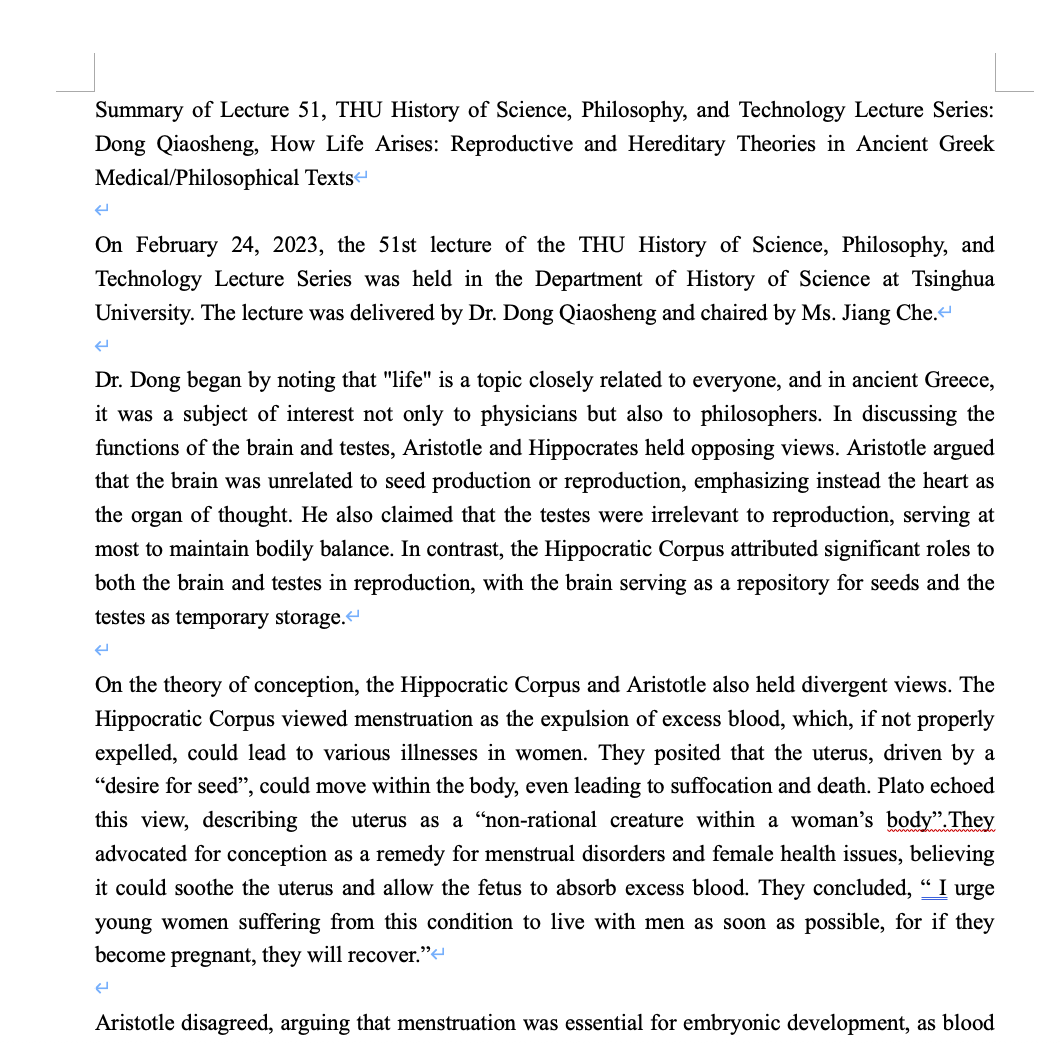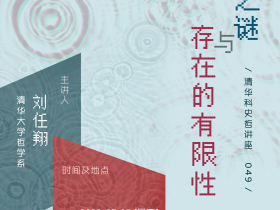On April 26, 2023, Lecture 53 of the Tsinghua Science, History, and Philosophy Seminar, held concurrently with the department’s regular academic meeting, was delivered by Professor Jianjun Mei, Director of the Joseph Needham Research Institute in Cambridge, UK, and a researcher at the McDonald Institute for Archaeological Research at the University of Cambridge. The lecture was titled "Recent International Developments in the Study of Joseph Needham’s Intellectual Legacy.

Professor Mei’s report was divided into three main sections: important conferences, special issues, and recent research related to Needham’s intellectual legacy.
Conferences
- 2015 Needham Memorial Conference:
This conference brought together scholars who had worked with Joseph Needham, as well as outstanding young scholars in the field of East Asian science history. The papers covered topics such as the value of Science and Civilisation in China (SCC), Needham's vision of a harmonious world, the early history of the Needham Research Institute, Needham’s organicist philosophy, the dissemination and influence of his work in Hong Kong, Japan, and South Korea, his contributions to the history of specific scientific disciplines, and future directions in East Asian science, technology, and medicine history. Professor Mei noted that participants generally agreed that Needham’s approach, which used modern Western science as a benchmark for ancient Chinese technology and relied on a binary framework of progress versus backwardness, had limitations. Most of the conference papers were published as a special issue in the journal Cultures of Science in 2020.
- 2018 Needham Symposium:
This symposium focused on scientific activities across the Eurasian continent, emphasizing the transmission and circulation of various scientific and technological knowledge. Papers addressed topics such as the long-distance dissemination of crops, archaeological evidence connecting Europe and China, and the transmission of Persian and Indian medicine to China.
- 2023 Third Needham Symposium:
Themed “Needham’s Vision of Dialogue”,this conference emphasized the concept of science as a product of multiple civilizations. Papers explored historical sociology, cosmology, natural sciences, and research methodologies within the context of Needham’s dialogic vision, while reflecting on Eurocentrism, cross-cultural astronomy, geography, linear algebra, herbal medicine, and the rise of modern science.
Professor Mei offered four comments on the three conferences:
- Needham’s work represents an academic process, beginning in the mid-20th century, of revealing the achievements and values of non-Western civilizations, with profound influence.
- Continuing to organize Needham symposia is of positive significance.
- Participants are predominantly middle-aged and elderly scholars, with few young scholars, necessitating intentional efforts to improve this balance.
- The strong disciplinary nature of the history of science and technology makes it challenging to foster effective interdisciplinary dialogue at these events.
Publications
Professor Mei highlighted a special issue of Isis from 2019 titled “A Second Look at Joseph Needham”. The special issue was initiated by historian of science H. F. Cohen and curated by Dagmar Schäfer, who also organized a forum that shares the same nomenclature. The special issue and forum focused on the global turn in the history of science and how various fields today utilize Needham’s work.
Professor Mei introduced the contributions of scholars at the forum, including a conversation between Caria Nappi and McKenzie Wark, BuYun Chen’s discussion of material and form concepts in Needham’'s work and their relation to his materialism, Helen Tilley’s global historical reflections on Needha’s work, and Guo Wenhua's discussion of universal medicine. The editors' introduction to the special issue made the following key points:
- Many scholars are now reflecting on the assumptions underlying the Needham Question and envisioning alternative methods for writing global histories of science.
- The field has moved beyond Needham’s binary framework and modern scientific classifications.
- While Needham envisioned a unified global scientific landscape, scholars today approach the history of globalization in science and technology from diverse perspectives.
Recent Research
In this section, Professor Mei shared some valuable papers he had recently read. These included critiques of SCC by C. Gillispie and Peter Perdue, Leon A. Rocha's evaluation of the relevance of Needham’s work to contemporary scholarship, studies on Needham’s Indian network, Zongtai Lin's discussion of Needham's influence in South Korea and Korea's role in East Asian science history, and analyses of Needham’s infuence in Taiwan from the perspectives of modernization and identity politics.
Conclusion
Finally, Professor Mei introduced the work of the Needham Research Institute, including its publishing efforts, scholarship programs, and academic activities, as well as its mission and vision.
Following the 90-minute lecture, attendees engaged in in-depth discussions with Professor Mei.
Key Questions and Discussions:
Jiang Che: To what extent have recent works by Japanese and Korean scholars been influenced by Needham’s work and the Needham Question? Are there plans for smaller-scale publications on the history of science and technology in East Asia?
Wang Zheran: Given the encyclopedic and detailed nature of SCC, is there a more accessible work based on SCC that could serve as a textbook for general education?
Lu Yili: What was the concrete arguments at the Second Needham Symposium involving Floris Cohen and others? Is it worthwhile to continue exploring Needham’s work on the history of biochemistry?
Shen Yubin: What are the future publication plans for SCC? Will there be a volume on the history of zoology in the sixth volume?
Wang Wei: Are there underlying philosophical positions behind the disputes involving Floris Cohen and others? How does Needham’s organicism relate to the work of other philosophers of science?
The lecture concluded with a summary by Professor Guo Guosheng.
Author: Wang Zilai
Reviewer: Jiang Che





